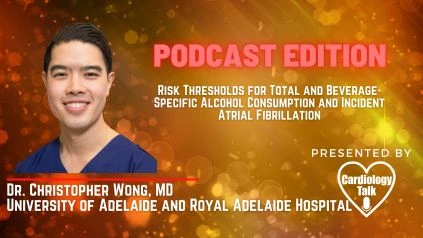Podcast- Dr. Christopher Wong, MD- Risk Thresholds for Total and Beverage-Specific Alcohol Consumption and Incident A...
Chris is a cardiologist who works in both clinical and academic settings. His research interests include cardiovascular medicine, cardiac rhythm disorders, and public health. He received a full scholarship to Pembroke School and graduated as Dux with the highest tertiary entry rating. He was awarded a Rhodes Scholarship after studying medicine at the University of Adelaide, where he was elected to the University Council. At the University of Oxford, he studied clinical trials, epidemiology, and population health for master's degrees before completing a PhD in cardiovascular medicine. In this video Dr. Wong discusses the Risk Thresholds for Total and Beverage-Specific Alcohol Consumption and Incident Atrial Fibrillation.
Link to Abstract-
https://www.jacc.org/doi/10.1016/j.jacep.2021.05.013
Abstract-
Objectives
This study sought to characterize associations of total and beverage-specific alcohol consumption with incident atrial fibrillation (AF).
Background
Although binge drinking and moderate to high consumption of alcohol are both established risk factors for AF, comparatively less is known about the effect of low alcohol consumption and whether associations differ by specific alcoholic beverages.
Methods
Using data from the UK Biobank, total and beverage-specific alcohol consumption was calculated as UK standard drinks (8 g alcohol) per week. Past drinkers and those with a history of AF were excluded. Incident AF events were assessed through hospitalization and death records, and dose-response associations were characterized using Cox regression models with correction for regression dilution bias.
Results
We studied 403,281 middle-aged individuals (52.4% female). Over a median follow-up time of 11.4 years (IQR: 10.7-12.3 years), a total of 21,312 incident AF events occurred. A J-shaped association of total alcohol consumption was observed, with lowest risk of AF with fewer than 7 drinks/week. Beverage-specific analyses demonstrated harmful associations of beer/cider consumption with any consumption. In contrast, consumption of red wine, white wine, and spirits up to 10, 8, and 3 drinks/week, respectively, was not associated with increased risk.
Conclusions
In this predominantly White population, low levels of alcohol consumption (<7 U.K. standard drinks [56 g alcohol]/week) were associated with lowest AF risk. Low consumption of red and white wine and very low consumption of spirits may not be associated with increased AF risk, whereas any consumption of beer/cider may be associated with harm. These findings may have important implications for the primary prevention of AF that should be explored in future studies.



